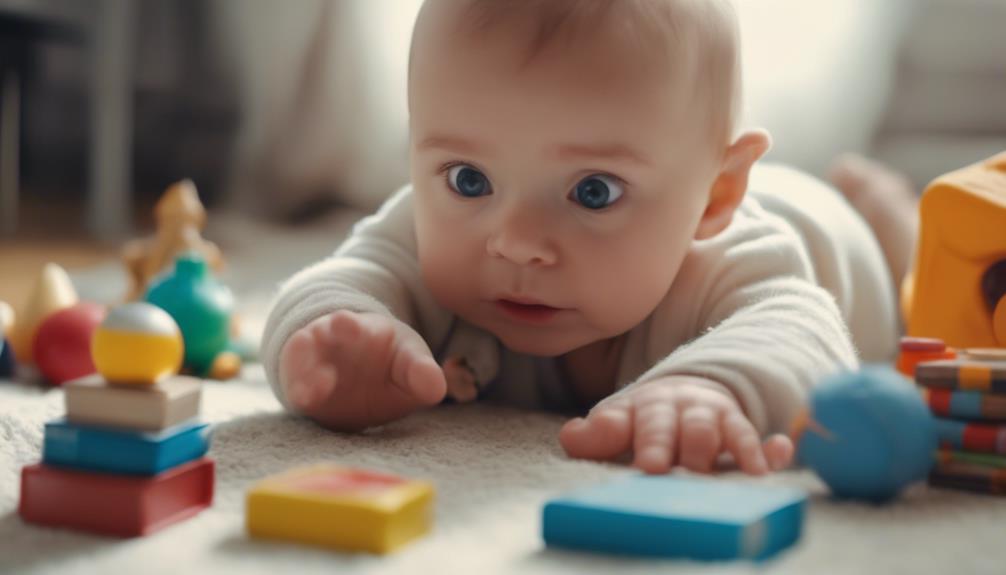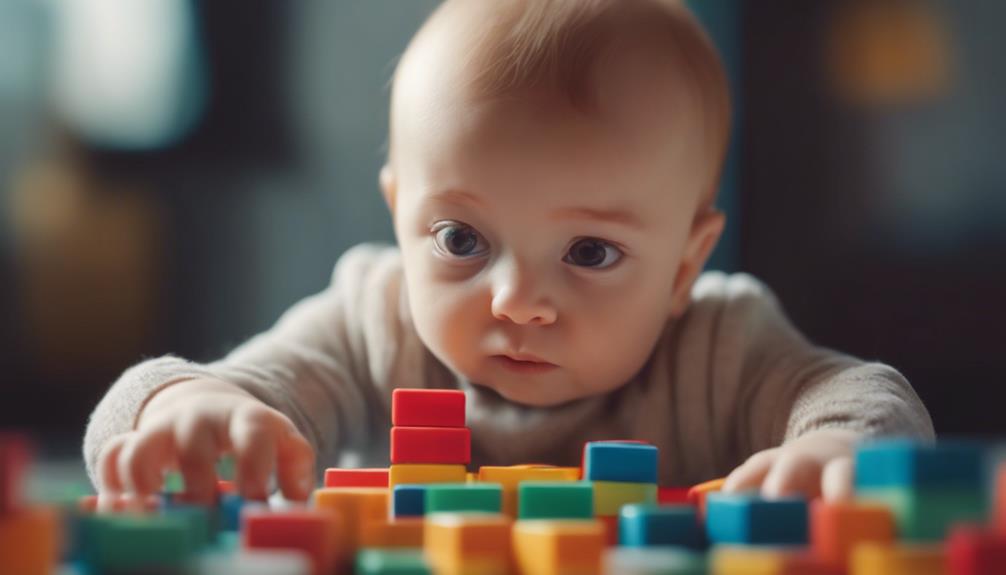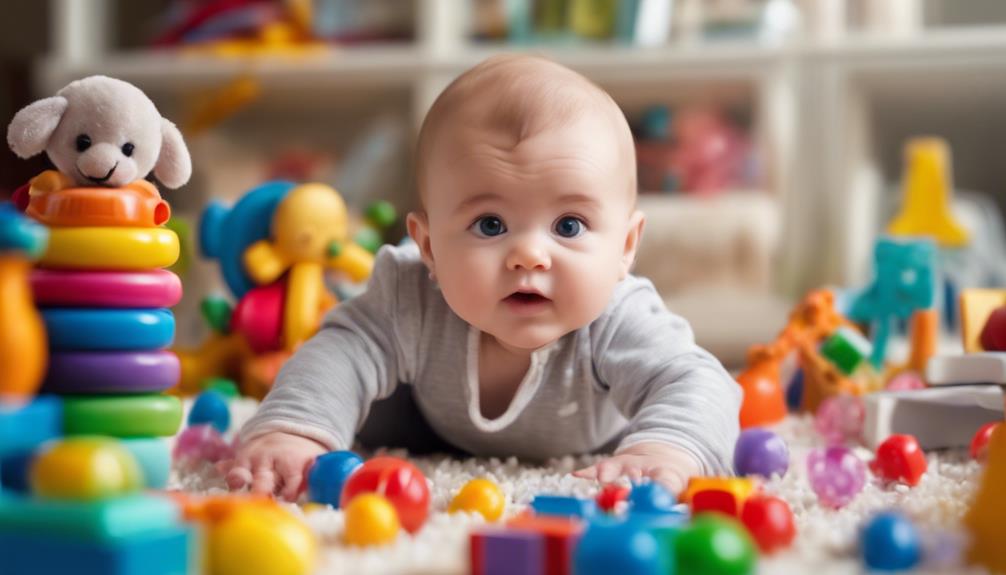Babies who are highly alert and actively engage with their surroundings demonstrate advanced cognitive abilities. Early development of motor skills such as sitting and walking, as well as creative problem-solving skills, are signs of high intelligence. Early babbling and rapid progress in language skills are also indicators of intelligence. Quick memory recall and pattern recognition can enhance problem-solving abilities. A baby’s insatiable curiosity, eagerness to learn, and problem-solving skills all contribute to intellectual growth. Advanced empathy, logic-based activities, and concentrated focus on tasks show social and emotional awareness. These early signs offer valuable insights into potential future capabilities.
Key Takeaways
- Alertness, curiosity, and strong presence indicate intelligence in babies.
- Early development of motor skills and coordination may suggest high intelligence.
- Advanced language skills, like early babbling and rapid vocabulary progression, are linked to intelligence.
- Efficient memory retention, quick recall, and strong pattern recognition are signs of intelligence.
- Unquenchable curiosity, problem-solving abilities, and social/emotional awareness are key indicators of intelligence in babies.
Alertness and Awareness
Recognizing early signs of intelligence in a baby often begins with observing their alertness and awareness levels. Highly alert babies tend to show early indications of intelligence by recognizing faces and responding to stimuli in their environment. This heightened alertness can be seen through quick bonding with family members, making consistent eye contact, and displaying a natural curiosity about their surroundings.
Intelligent babies often exhibit a sense of heightened awareness and responsiveness from a young age, showing a keen interest in their environment and displaying early cognitive abilities. Early signs of an intelligent baby may include being quick to smile, coo, wave, and actively engage with their surroundings. Alert babies typically have a strong presence, showing a genuine interest in the world around them.
Their ability to quickly grasp and respond to stimuli showcases their advanced level of alertness and awareness, setting a foundation for continued cognitive development.
Motor Skills Development

Highly intelligent babies often showcase their cognitive abilities through advanced motor skills development. This includes early milestones like sitting up alone at 3 months and walking sooner than average. Exceptional coordination and physical agility beyond typical milestones can indicate high intelligence in infants. Quick reflexes, strength, and high energy levels in babies may suggest advanced cognitive abilities.
Here are some signs to look out for:
- Demonstrating innovative thinking in their approach to solving simple motor challenges.
- Showing a strong interest in creative activities that involve physical movement.
- Displaying a heightened level of physical expression through artistic movements.
Babies with advanced motor skills may not only excel physically but also demonstrate leadership qualities and adapt well to social situations. By observing your baby's motor skills development and considering these indicators of high intelligence, you can better understand their cognitive abilities and potential for future growth.
Language Proficiency

Babies who start making early babbling sounds and reach vocabulary development milestones early on often show signs of advanced language proficiency, which can be linked to intelligence.
When babies engage in mimicking sounds and attempting to communicate, it indicates a strong foundation for language skills and cognitive development.
Early language development, including forming words and interacting with words regularly, is a key indicator of higher intelligence levels in babies.
Early Babbling Sounds
Starting to babble early, around 6-9 months, can indicate advanced language skills in babies, a key indicator of intelligence. Early babbling is vital for language development and can pave the way for strong communication abilities and vocabulary.
Here are some key points to keep in mind:
- Babies who engage in early babbling tend to have better language proficiency later in life.
- Intelligent babies often exhibit more complex babbling patterns, like combining different sounds, showing an early grasp of language nuances.
- Encouraging early babbling by responding to your baby's sounds, engaging in conversation, and reading aloud can support their language development and intelligence.
Vocabulary Development Milestones
Developing a rich vocabulary at a young age can be a strong indicator of advanced language proficiency in infants. Early signs of high vocabulary development include babies showing clear sentences by 10 months old and making early attempts at speaking and mimicking sounds.
Rapid progression in vocabulary milestones, such as identifying objects and animals, can suggest intelligence. Babies who enjoy listening to books being read and try to talk early are likely to have advanced language skills.
Exposure to multiple languages at a young age can also boost language proficiency and potentially signify high intelligence. Hence, if you notice your infant reaching vocabulary development milestones quickly, engaging with language early on, or being exposed to various languages, these could be positive signs of their linguistic capabilities and cognitive potential.
Keep encouraging their language exploration and development to support their growing intelligence.
Memory Retention

Intelligent babies possess exceptional memory retention abilities right from the start. They can quickly recall familiar faces, sounds, and experiences with impressive clarity.
Early recognition of patterns and strong memory skills are positive indicators of a baby's intelligence level.
Quick Memory Recall
A baby's ability to recall memories quickly and accurately can serve as a strong indicator of their intelligence level. Intelligent babies with exceptional memory retention often exhibit quick memory recall abilities, allowing them to adapt faster and showcase high intelligence levels.
Here are some key points to ponder regarding quick memory recall in babies:
- Enhanced Problem-Solving Skills: Quick memory recall aids intelligent babies in solving problems efficiently by drawing on past experiences or information.
- Accelerated Cognitive Development: Babies with quick memory recall tend to show faster cognitive development as they can process and retain new information more effectively.
- Improved Adaptation to New Challenges: The ability to recall memories swiftly enables babies to adjust and respond to new situations with ease, showcasing their intelligence early on.
Pattern Recognition Skills
Connecting to the previous discussion on quick memory recall, babies with strong pattern recognition skills demonstrate a heightened ability for memory retention. This advanced memory skill allows them to remember faces, sounds, and sequences with remarkable accuracy. Early indicators of intelligence often include the consistent ability to recall and recognize patterns. The exceptional memory skills seen in babies not only aid in memory retention but also set the stage for quicker learning and improved problem-solving abilities. Furthermore, these pattern recognition abilities in infancy can significantly contribute to cognitive development and pave the way for academic success in the future.
| Benefits of Strong Pattern Recognition Skills | |
|---|---|
| Enhanced Memory Retention | Improved Problem-Solving Abilities |
| Foundation for Cognitive Development | Pathway to Academic Success |
Early Language Retention
Babies with high intelligence often display exceptional memory retention skills, enabling them to recall words, sounds, and experiences from a very young age. Advanced language skills in infants can serve as an early indicator of intelligence, showcasing their ability to retain and retrieve information efficiently.
Here are some key points to ponder regarding early language retention in gifted babies:
- Gifted babies may exhibit remarkable memory retention, effortlessly recalling information learned or experienced previously.
- Early language retention in infants can be a sign of advanced cognitive abilities, demonstrating their capacity to remember and process spoken language effectively.
- Memory retention in babies can indicate intelligence, especially when they consistently remember words, sounds, or specific events.
Understanding the significance of memory retention in infants, particularly in relation to language skills, can provide insights into their cognitive development and potential for advanced learning abilities.
Curiosity and Learning

When observing signs of intelligence in babies, a key indicator often lies in their unquenchable curiosity and keenness to learn.
Highly intelligent infants exhibit a deep sense of exploration, constantly seeking to understand the world around them. Their advanced cognitive abilities drive them to ask complex questions, challenging adults and showing a genuine interest in a wide range of subjects.
This intrinsic curiosity not only signifies intelligence but also serves as a catalyst for enhanced learning and problem-solving skills.
Encouraging and nurturing a baby's inquisitiveness can greatly contribute to their intellectual development and foster a lifelong love for learning.
By actively engaging with their curiosity, you can support their natural inclination towards exploration and help them build a solid foundation for future academic and personal growth.
Problem-Solving Abilities

Developing problem-solving abilities in infants can lay the foundation for their intellectual growth and cognitive development. Babies who exhibit exceptional problem-solving skills early on may show signs of high intelligence. Encouraging challenges and tasks can help nurture a baby's problem-solving abilities. Supporting and cheering babies through problem-solving tasks not only boosts their cognitive development but also enhances their interactive play experiences.
Interactive play and engaging challenges provide a stimulating environment for babies to learn and grow. By introducing various problem-solving tasks in a nurturing manner, caregivers can support the baby's cognitive development and foster a sense of accomplishment. Remember, every baby is unique, and their problem-solving abilities may manifest differently.
Social and Emotional Awareness

Moreover, enhancing social and emotional awareness in infants can serve as a key indicator of their intelligence and emotional intelligence levels.
Gifted babies often display advanced empathy and understanding towards others' emotions, showcasing a depth of emotional awareness beyond their years. These infants may gravitate towards logic-based activities, enjoying the mental challenge they provide. Additionally, their social behavior might include a preference for solitary play or intense focus on specific tasks, indicating a high level of cognitive engagement.
Intelligent babies may also show a keen interest in interacting with older individuals, benefiting from the more complex social interactions they offer. Moreover, early signs of high IQ in babies can be observed through their preference for novel and challenging stimuli, demonstrating an advanced awareness and a thirst for cognitive stimulation.
Frequently Asked Questions
How to Tell if Your Baby Is Intelligent?
Wondering if your baby is intelligent? Look for early achievement of milestones like sitting up or clear sentences. Watch for extended focus, exceptional problem-solving, preference for solitude, curiosity, and enthusiasm to learn.
How to Tell if Your Child Is Gifted at Age 1?
So, you've got a little Einstein on your hands, huh? Look for problem-solving skills, advanced language, rapid cognitive growth, logic love, curiosity, alertness, strong memory, and social savvy. Your baby might be a genius!
How Early Do Genius Babies Talk?
Genius babies may start talking as early as 10 months old. You might notice them forming clear sentences and demonstrating advanced language skills. Early speech development can be a sign of high intelligence and cognitive abilities.
Are Babies Who Reach Milestones Early Smarter?
You know, hitting milestones early doesn't necessarily mean you're smarter. Each baby grows at their own pace. Celebrate every step forward, big or small, and nurture their unique journey towards intelligence.
Conclusion
To sum up, recognizing signs of intelligence in babies can help parents and caregivers better understand and support their development. By paying attention to indicators such as alertness, motor skills, language proficiency, memory retention, curiosity, problem-solving abilities, and social and emotional awareness, you can help nurture your child's potential.
Remember, every baby is unique, so celebrate their individual strengths and support their growth with love and encouragement. Just like a budding flower, their intelligence will continue to bloom with the right care and attention.










